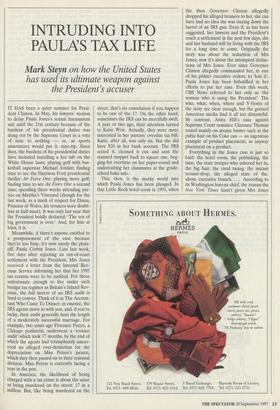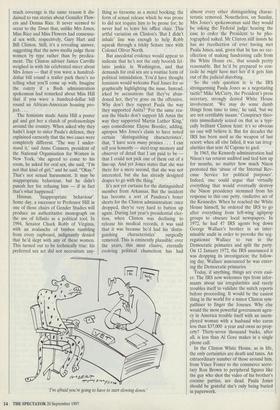INTRUDING INTO PAULAS TAX LIFE
Mark Steyn on how the United States
has used its ultimate weapon against the President's accuser
IT HAS been a quiet summer for Presi- dent Clinton. In May, his lawyers' motion to delay Paula Jones's sexual harassment suit until the 21st century because of the burdens of his presidential duties was slung out by the Supreme Court in a vote of nine to nothing — or, as sports announcers would put it, nine-zip. Since then, the burdens of his presidential duties have included installing a hot tub on the White House lawn; playing golf with bas- ketball superstar Michael Jordan; finding time to see the Harrison Ford presidential thriller Air Force One; playing more golf; finding time to see Air Force One a second time; spending three weeks attending par- ties on Martha's Vineyard (though for the last week, as a mark of respect for Diana, Princess of Wales, his trousers were doubt- less at half-mast). It was only last year that the President boldly declared: 'The era of big government is over.' And, for him at least, it is.
Meanwhile, if there's anyone entitled to a postponement of the case because they're too busy, it's now surely the plain- tiff, Paula Corbin Jones. Late last week, five days after rejecting an out-of-court settlement with the President, Mrs Jones received a letter from the Internal Rev- enue Service informing her that her 1995 tax returns were to be audited. For those unfortunate enough to live under such benign tax regimes as Britain's Inland Rev- enue, the full horror of an IRS audit is hard to convey. Think of it as The Accoun- tant Who Came To Dinner: in essence, the IRS agents move in with you, and, if you're lucky, their audit generally lasts the length of a moderately successful marriage. For example, two years ago Florence Peters, a Chicago podiatrist, underwent a 'routine audit' which took 17 months, by the end of which the agents had triumphantly uncov- ered an alleged over-deduction for the depreciation on Miss Peters's jacuzzi, which they then passed on to their criminal division. Miss Peters is currently facing a year in the pen.
In America, the likelihood of being charged with a tax crime is about the same as being murdered on the street: 17 in a million. But, like being murdered on the street, that's no consolation if you happen to be one of the 17. On the other hand, sometimes the IRS can be mercifully swift. A year or two ago, their attention turned to Katie Weir. Actually, they were more interested in her parents' overdue tax bill: Katie, after all, was only six. But she did have $26 in her bank account. The IRS seized it, cleaned it out and sent the stunned moppet back to square one, beg- ging for overtime on her paper-round and undercutting her classmates at the grade- school bake sale.
This, then, is the murky world into which Paula Jones has been plunged. In that Little Rock hotel room in 1991, when the then Governor Clinton allegedly dropped his alleged trousers to her, she can have had no idea she was staring down the barrel of an IRS gun. Even if, as has been suggested, her lawyers and the President's reach a settlement in the next few days, she and her husband will be living with the IRS for a long time to come. Originally the story was about the seduction of Mrs Jones; now it's about the attempted deduc- tions of Mrs Jones. Ever since Governor Clinton allegedly commanded her, in one of his pithier executive orders, to 'kiss it', Paula Jones has been befuddled in her efforts to put her case. Even this week, CBS News referred to her only as 'the woman who is suing the President'. The who, what, when, where and Y-fronts of the story are clear enough, but the genteel American media find it all too distasteful. By contrast, Anita Hill's case against Supreme Court nominee Clarence Thomas rested mainly on arcane banter such as the pubic hair on his Coke can — an ingenious example of product placement, or anyway placement on a product.
Everything in the Jones case is just so bald: the hotel room, the politicking, the time, the state trooper who ushered her in, the big hair, the rural twang, the instant trouser-drop, the alleged state of the, ahem, executive branch.. . According to its Washington bureau chief, the reason the New York Times hasn't given Mrs Jones much coverage is the same reason it dis- dained to run stories about Gennifer Flow- ers and Donna Rice. It never seemed to occur to the Times that, unlike Mrs Jones, Miss Rice and Miss Flowers had consensu- al sex with, respectively, Gary Hart and Bill Clinton. Still, it's a revealing answer, suggesting that the news media judge these women by type rather than by predica- ment. The Clinton adviser James Carville weighed in with his celebrated sneer about Mrs Jones — that if you wave a hundred- dollar bill round a trailer park there's no telling what you'll come up with. Imagine the outcry if a Bush administration spokesman had remarked about Miss Hill that if you wave a hundred-dollar bill round an African-American housing pro- ject. . . .
The feminists made Anita Hill a poster gal and got her a clutch of professorships around the country. When asked why they hadn't leapt to sister Paula's defence, they explained earnestly that the two cases were completely different. 'The way I under- stand it,' said Anne Conners, president of the National Organisation for Women in New York, 'she agreed to come to his room, he asked for oral sex, she said, "I'm not that kind of girl," and he said, "Okay." That's not sexual harassment. It may be inappropriate behaviour, but he didn't punish her for refusing him — if in fact that's what happened.'
Hmmm. 'Inappropriate behaviour'. Some day, a successor to Professor Hill in one of those chairs of Gender Studies will produce an authoritative monograph on the use of fellatio as a political tool. In 1994, Senator Chuck Robb of Virginia, with an avalanche of bimbos tumbling from every cupboard, indignantly denied that he'd slept with any of these women. This turned out to be technically true: his preferred sex act did not necessitate any- thing so tiresome as a motel booking; the form of sexual release which he was prone to did not require him to be prone for; he never had to leave his office chair. This artful variation on Clinton's 'But I didn't inhale' line was enough to help Robb squeak through a tricky Senate race with Colonel Oliver North.
But anecdotal evidence would appear to indicate that he's not the only boorish fel- latio junkie in Washington, and that demands for oral sex are a routine form of political intimidation. You'd have thought feminists would welcome Paul Jones for so graphically highlighting the issue. Instead, irked by accusations that they've aban- doned her, they've gone on the offensive. Why don't they support Paula the way they supported Anita? 'For the same rea- son the blacks don't support Idi Amin the way they supported Martin Luther King,' says comedienne Elayne Boosler, adding, apropos Mrs Jones's claim to have noted certain 'distinguishing characteristics', that, 'I have seen many penises . . . I can tell you honestly — steel-trap memory and observer of detail that I am paid to be that I could not pick one of them out of a line-up. And yet Jones states that she was there for a mere second, that she was not interested, but she has already designed drapes to go with the thing.'
It's not yet curtains for the distinguished member from Arkansas. But the incident has become a sort of Pandora's boxer shorts for the Clinton administration: once dropped, they're very hard to button up again. During last year's presidential elec- tion, when Clinton was declining to release his medical records, it was said that it was because he'd had his 'distin- guishing characteristics' surgically removed. This is eminently plausible: over the years, this most elusive, eternally evolving political chameleon has had Tin afraid you're going to have to start slowing down.'
almost every other distinguishing charac- teristic removed. Nonetheless, on Sunday, Mrs Jones's spokeswoman said they would be asking the Federal judge hearing the case to order the President to be pho- tographed naked. Mr Clinton still insists he has no recollection of ever having met Paula Jones, and, given that he has no rec- ollection of making fundraising calls from the White House etc., that sounds pretty reasonable. But he'd be prepared to con- cede he might have met her if it gets him out of the judicial disrobing.
So the only question is: is the IRS strongarming Paula Jones as a negotiating tactic? Mike McCurry, the President's press secretary, strongly denied White House involvement. 'We may do some dumb things from time to time,' he said, tut we are not certifiably insane.' Conspiracy theo- rists immediately seized on that as a typi- cally brilliant Clinton feint: it's so obvious no one will believe it. But for decades the IRS has been used as the weapon of last resort: when all else failed, it was tax irreg- ularities that sent Al Capone to gaol.
In 1963, the Kennedy administration had Nixon's tax returns audited and tied him up for months, no matter how much Nixon protested this 'abuse of the Internal Rev- enue Service for political purposes'. Indeed, one could argue that virtually everything that would eventually destroy the Nixon presidency stemmed from his response to this one petty, vindictive act of the Kennedys. When he reached the White House himself, he ordered the IRS to go after everything from left-wing agitprop groups to obscure local newspapers. In 1972, he had 47 IRS agents bog down George Wallace's brother in an inter- minable audit in order to provoke the seg- regationist Wallace to run in the Democratic primaries and split the party. On 12 January 1972, the IRS announced it was dropping its investigation; the follow- ing day, Wallace announced he was enter- ing the Democratic primaries.
Today, if anything, things are even easi- er. The IRS now welcomes tips from infor- mants about tax irregularities and rarely troubles itself to validate the snitch reports before proceeding. It would be the easiest thing in the world for a minor Clinton sym- pathiser to finger the Joneses. Why else would the most powerful government agen- cy in America trouble itself with an unem- ployed woman with a husband who earns less than $37,000 a year and owns no prop- erty? Thirty-seven thousand bucks, after all, is less than Al Gore makes in a single phone call.
In the Clinton White House, as in life, the only certainties are death and taxes. An extraordinary number of those around him, from Vince Foster to the commerce secre- tary Ron Brown to peripheral figures like the guy who shot the video of his brother's cocaine parties, are dead. Paula Jones should be grateful she's only being buried in paperwork.



































































 Previous page
Previous page